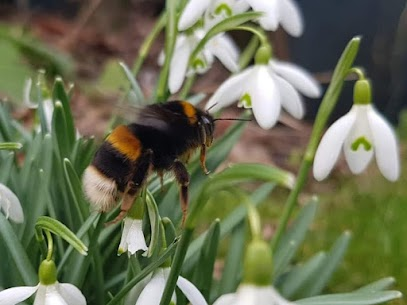Musings of May
Hear, past midnight - the cacaphony of quacks
where coquettish carps now flirt their backs.
The little lambs are prancing! How the pasture's graced:
they gambol gaily through that springtime frame of May.
- M. Kruijff
Lloyd Haft's foreword to Herman Gorter's May
When I was choosing my angle
to write this foreword for M. Kruijff's translation of Gorter’s May,
what crossed my mind was the American poet Robert Frost's famous one-liner
definition of poetry: ‘Poetry is what gets lost in translation.’ As one who for
decades taught Chinese poetry via translations, I can testify to the lamentably
widespread truth of it.
Yet,
I can also affirm that it is but a partial truth. Translations of poetry can
themselves be poetry. I was more or less ‘converted to’ Chinese poetry by A. C.
Graham’s Poems of the Late T’ang (Penguin, 1965). Somehow the evocative
elegance of Graham’s phrasing in English, together with his commentaries which
assured me that he really did know what the originals meant, gave me the
feeling that I was missing nothing by not (at that time) being able to read the
originals. Rather, I was gaining a new rich source of poetic enjoyment. Since
then, as a scholar I have learned to read Chinese. But I have never lost a
secret preference for poetry that has been brought within the easeful and
matchlessly adequate milieu of my native language. To me the ‘real’ meaning of
a text is in the words I would use in retelling it to myself.
After
I arrived in Holland as a graduate student in 1968, I learned Dutch pretty
quickly and by three years later was already trying my hand at translating
poetry. I soon discovered Herman Gorter via his wildly experimental
‘sensitivist’ Verses (Verzen, 1890) – just about the most difficult
thing with which to begin. I knew that Gorter was at least equally famous for a
slightly earlier work, the epic May (Mei, 1889). But May was
written in regular meter and rhymed couplets, and for me at that time, this was
reason enough not to read it. In the modern American poetry to which I was
accustomed, it was considered slightly ridiculous to write in traditional forms
– or, for that matter, to translate into them. One of my favourite poets,
Robert Lowell, wrote in the introduction to his translations collected in Imitations
(1958): ‘Strict metrical translators still exist...but they are taxidermists,
not poets...’ So, to me for half a century Herman Gorter remained the poet of Verses
but not of May.
Just
a couple of months ago, in early 2021, I had an experience which confirmed me
in the notion that poetry in a foreign language has perhaps the most depth for
me when I can ‘acquire’ it in the language of my earliest childhood. I happened
to come across M. Kruijff’s new English rendering of May. Once I started
reading it, I could hardly put it down – this ‘despite’ the fact that it is
written in a slightly liberalised but still recognizable variant of Gorter’s
pentameter couplets. The English of Kruijff’s version is certainly not everyday
English whether British or American. Nor is it the flattened, cautiously
academic English of so many translations. As I perceive it, it harks back to a
somewhat earlier stage at which Dutch and English were still more obviously
sister languages, both rooted in an older stratum of Germanic words, rhythms,
and myths which was one of Gorter’s own fountainheads while he wrote May.
If the English sounds somewhat archaic, so does the original. For me, this
strangely appropriate uncommon voice or tone makes the narration a delight to
read.
Would
Robert Frost have approved? I think so. Besides the wry quip on poetry and
translation that I have quoted above, there is another statement by Frost, much
less well known, that reads: ‘Poetry is when an emotion has found its thought
and the thought has found words.’ It is clear from Kruijff’s introduction and acknowledgments
that his own process of translation began from a powerful emotion, proceeded
through a years-long process of thought, and finally ‘found words.’ The words,
time and time again, are as surprising as they are memorable. In other words,
this is a poetic translation of a poetic original. It is with pleasure that I
heartily recommend it.
Lloyd Haft
Oegstgeest, The Netherlands
October 2021
So fell a lot of flowers in the flow; It took them with it, stuck them to the bounds Of the estates, and Holland soon was found Alight with little flames. The pastures' whiff Fills sails of ships, and rich blossoms adrift On wind adorn the orchard trees for miles, No burden to them, they'll just stay a while.
She found then, at the highest of sharp mounds
Of barren heather-hills, which formed a round
Fortification of a shallow hole,
A wall about a heath-camp like a bowl
With dark erica, not yet flowery.
She chased a bee that buzzed there hungrily
For honey, stepped into it, disappeared
From the red fire of the celestial sphere
That glowed beneath her arms. And there she sat
Down watching with wide eyes the unripe bed...
Like summer red that poppy flower, when
Wrinkling its red it withers while it bends
Its shank and sinks its tender stem down slowly –
Just so bent May as well her head down slowly
And pale and paler turned those cheeks of hers,
And the desire too turned weak and weaker
That burns inside the eyes of mortal man.
And far and further back that circle went,
The woolly band of fire, cavaliers
Alike that ride out wide to mutineers
On the attack: they cause a widespread still.
May by Herman Gorter and The Essential Gorter are available worldwide
.jpeg)










Comments
Post a Comment